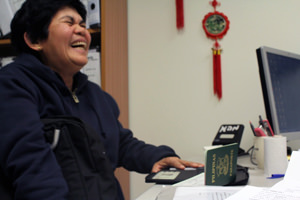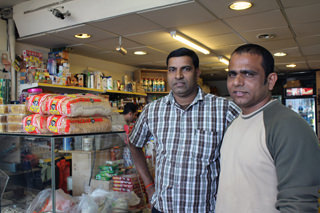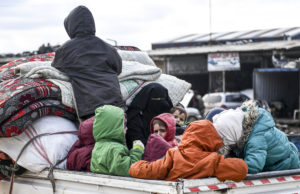The Other Israelis
Israel began importing workers after the government choked off the flow of cheap Palestinian labor Abuse and corruption are rampant as employers take advantage of a revolving-door policy meant to protect the state’s Jewish identity.
By Mary Slosson, Albert Sabaté, and Andrew Khouri
TEL AVIV, Israel — After running up four flights in an unlit and poorly marked staircase in a drab concrete building in the heart of immigrant south Tel Aviv, Sheila begged her way through the front desk at a migrant worker advocacy group and arrived, short for breath, in the office of advocate Idit Lebovitch.
Her hands were clasped together in a quest for forgiveness and salvation.
Then she opened her mouth, and a stream of “I’m sorrys” and “thank yous” began tumbling out in her broken English as she explained her dilemma.
Sheila, a middle-aged Indian migrant worker in Israel, was in trouble. After paying an Indian middleman named “Richard” $9,000 cash for a visa to care for the elderly in Israel, she arrived in Tel Aviv with barely any knowledge of either Hebrew or English. She didn’t last long in her initial workplace because of that language barrier.
Six months and several jobs later, her most recent employer was refusing to pay the back wages she had earned. When Sheila quit, he threatened to have her deported, she said. If she didn’t find a new job soon — within 30 days — her visa would expire, putting her on the path to deportation and an uncertain future.
“If she gets sent home, it is a life sentence for her. I mean she will probably get killed, because she will never be able to pay back the money,” said Lebovitch, caregiver coordinator for Kav LaOved, a nongovernmental organization that advocates for workers’ rights.
Sheila mortgaged her family’s house in India in order to take out the loan, and has paid only 5 percent back. “They’ll probably kill her, then her family, then … ” Lebovitch trailed off. “That’s what they do. It’s a black market.”
Lebovitch found a translator to help communicate with Sheila as tears streamed down her weary face, leathery with time and hardship. She eventually shuffled out of the office with a list of work agencies, her future far from certain.
Sheila found herself at the crux of sensitive issues for the state of Israel, where existential concerns about the Jewishness of the state clash against the invisible hand of globalization, which can provide caregivers from southeast Asia for far cheaper than even Palestinian labor. The result of Israel’s complicated relationship with migrant workers has created a strikingly exploitative system, according to NGOs.
Israel began importing workers beginning in the 1990s to fill jobs in agriculture, nursing and construction after the government choked off the flow of cheap Palestinian labor due to uprisings in the Occupied Territories.
Workers from that new wave of immigration consistently report paying thousands of U.S. dollars for the privilege of working inside the Jewish state, a practice that is illegal under Israeli law.
Migrant worker advocates charge that the state is profiting from the exploitation of migrants.
“The Israeli government is implementing what we call the revolving door policy,” said Sigal Rozen, public policy coordinator for the Hotline for Migrant Workers. “They keep on bringing new workers constantly, deporting those who know their rights and demand more money.”
But from the government’s point of view, migrant worker policy focuses on identity. Policy works to prevent migrants from integrating or establishing themselves into Israeli society. By not allowing migrants to establish families or bring other family members knocking, the revolving door protects the state’s Jewish identity. In fact, the government terms workers not as “migrants” but as “foreign workers.”
“The decisions of the Israeli government are connected to the Jewish character. We shouldn’t be ashamed of that. Israel is a Jewish country,” said Roi Lachmanovitch, spokesperson for Eli Yishai, Israel’s arch right-wing deputy prime minister and minister of internal affairs. “Israeli policy is not to increase foreign workers.”
Whether intentional or not, this “revolving door” has side effects that serve the interests of everyone but the migrants. Abuse and corruption are rampant as employers and recruitment agencies take advantage of workers’ fragile status.
Because recruitment agencies make money for each worker they import, there is no incentive to retain workers, advocates say. Agencies have an interest in bringing new workers rather than finding a new job for those already inside Israel, for even short-term unemployment quickly leads to deportation. The result is a new worker being imported who has to pay high fees to the agency, creating a high profit margin in a cash market that is near-impossible to monitor or regulate.
Caregiving
Five years ago, Nina Tabarrejo borrowed roughly $6,000 to pay a recruitment agency that helped her secure a visa and work in Israel. But once in Israel, this debt prevented her from leaving an abusive employer.
|
|
Officially, individuals who seek employment within Israel pay a state-capped brokerage fee of $980 to an agency that matches the worker to an employer. But according to Kav LaOved, each year incoming migrants report paying more for work permits. Today, workers pay $9,000 on average.
Visas tie workers to their employers, meaning that if a worker quits, he or she has 30 days to find work in the same industry or risk deportation.
Because of their debts, which normally take two to three years to repay, workers often avoid reporting abuses, human rights groups say.
“They’re afraid to leave,” said Dana Shaked, Kav LaOved’s spokesperson. “Because if they leave they won’t be able to send back money to their families and to the loans.”Tabarrejo’s experience and relationship with her employer was “very, very difficult,” she recalled somberly. But she needed the money to support her extended family and diabetic brother in the Philippines.
She was constantly harassed, worked overtime, never got a full night of rest and wasn’t able to live out her own ethnic and cultural customs, like eating seafood.
Her official employer was an older woman who had suffered a stroke and had difficulty moving around the house. Her employer obsessed that Tabarrejo was stealing her money, clothes and personal items.
Tabarrejo was forced to share the same room with her employer (for which rent was deducted from her pay), like 31 percent of caregivers, and remained isolated in a fairly inaccessible village.
The small middle-aged woman laughed nervously as she recounted her story in a thick accent. Never married, the good-natured Filipina’s eyebrows raised as she recounted the most arduous portions of her story.
In a report released in December, Kav LaOved found that the live-in situation common to the caregiving sector can create a system of round-the-clock employment in which caregivers often work in extremely harsh conditions without adequate work-rest balance, resulting in health deterioration and injuries.
Almost a third (29 percent) of workers reported not receiving any regular breaks during the day. Almost half (46 percent) complain of back pain from lifting heavy patients or working household chores for long hours.
Uninterrupted sleep was impossible for Tabarrejo. At night, she awoke every two hours to help her employer use the bathroom. During the day, in addition to helping the elderly woman, she cooked, cleaned and ran household errands.
Tabarrejo was in effect given only one day off; she was allowed to rest from 6 a.m. to 6 p.m. on Sundays. Because of limited public transportation and the village’s remoteness, traveling to be with her friends and for leisure became unrealistic.
And anytime she was in her employer’s house, even during her time off, she was expected to work.
She was mentally, emotionally and physically exhausted. Touching her chest, Tabarrejo repeated, “It was very difficult here deep [inside my] heart.”
Of the migrant caregivers surveyed by Kav LaOved, only 6 percent said they got a 36-hour rest period each week, as required by Israeli law. Practically all workers said they were on call 24 hours a day. The average caregiver worked 12.7 hours per workday adding up to more than 325 hours a month.
The report, which was presented at the United Nations committee that monitors discrimination against women, asserted that these issues are a function of the social isolation and financial vulnerability of migrant caregivers. Additionally, other widespread problems include employers withholding pay for months, refusing to pay overtime or provide benefits. And sexual assault of migrants is widespread, the report said.
While Tabarrejo hasn’t experienced sexual abuse, she said her friends have been subjected to various forms of molestation, including being forced to masturbate their employers, she said. According to the report, 35 percent of caregivers suffer verbal abuse, 12 percent suffer physical abuse and 4 percent suffer sexual abuse.
“I promise you, we are working very hard to save the rights of the workers,” said Lachmanovitch, citing a principle in Judaism to take care of one’s neighbors. But he admitted that deporting unauthorized migrants remains a central focus.
After two years and seven months of working for her first employer, Tabarrejo could take no more. She quit, with just two months of payments left. She was able to find another job where she has happily worked since.
In total, her loan cost her three times what she borrowed. She paid back almost $23,000.
In March, Tabarrejo’s second employer died. She’s been here longer than the 63-month standard allowed by her caregiver visa. She can no longer work or live legally in Israel.
Many workers with expired visas return to their countries of origin, but not all. Regardless, Israel still awards visas to thousands of new workers. In 2009, some 27,000 workers entered Israel while 23,000 left the country. In 2010, some 32,000 foreign workers entered Israel on work permits — an increase of 5,000 compared with the previous year, according to a government report. Meanwhile, 30,000 left the country.
Tabarrejo should be going back, but she won’t. She plans to continue working as a caregiver under the radar, she said. She has already found a temporary gig working for a friend who is taking a monthlong vacation to the Philippines. She plans to stay another year or two covering shifts for her friends.
Visa overstays or tourists turned permanent residents pose an ongoing challenge for the government, with more than 100,000 unauthorized migrants in the country.
The Underground
In a country where the ever-present mix of Hebrew and Arabic serves as a constant reminder of the core identity crisis, South Tel Aviv is a jarring divergence from that dominant narrative.
With impromptu tin-sheet houses constructed alongside more permanent buildings and graffiti on the walls in a smorgasbord of written languages, the area has a distinctly foreign feel.
The neighborhood crystallizes around the central bus station, a looming concrete structure that is maze-like inside, with stores bursting with knockoff jeans, tchotchkes and Asian food filling all seven floors. Buses depart and arrive with such frequency that the surrounding buildings have picked up layers of grit from the smoke they belch as they navigate the tentacle-like ramps that lead to the station.A stroll to nearby Levinski Park takes one along sidewalks dotted with signs advertising calling cards to Thailand, the Philippines, Sudan and Nepal.
Tucked underneath an elevated ramp to the central bus station and between signs advertising restaurants in Hebrew is a shop bearing an English-language sign — “Maharaja Indian Market” — where Rohith Kumar works.
Kumar moved to Israel six years ago when a friend offered to arrange a caregiver visa in exchange for $7,000. He was fleeing violence in his hometown of Mangalore, India, where his brother had been killed in Hindu-Muslim clashes.
“When I came to Israel, my wife was pregnant,” said Kumar, 37, who spoke freely about his life story from the cramped and dusty second floor of his Indian market. “I didn’t see my child until three years later.”
Upon arriving in Tel Aviv, Kumar immediately plunged into a murky work environment where all parties involved — the work agency, his employers and himself — deceived the government and the immigration police. Despite having a caregiver visa, he said he never worked one day caring for the elderly people he was ostensibly in Israel to assist.
The agency that brought him to Israel — which, coincidentally, no longer exists — was “crooked,” according to Kumar. He would pay the agency $3,000 to $4,000 every three months, or else it would “cut off” his visa, causing him to be sent to jail by immigration police for violating the terms of his stay in Israel.
|
|
“If you don’t pay, they make problems for us,” he said.
Meanwhile, he worked for his supposed employer for free only two days a week, cleaning the house or gardening. The arrangement was, essentially, a front.
“A lot of Indian people are working not legally. We have a visa, but we are never working legally,” he said. Many people engage in black market, cash-based work “like house cleaning so that we can get a lot of money. I have also been working like that before.”
The agency taught both the immigrant and the employee to game the system. If Kumar was questioned by police about working for a family not designated on his visa, he would say that he was on his day off, visiting friends. And if the immigration police asked his supposed employers where their worker was, they would say he had gone to the store.
“The agency, they show the way how because they are also making business. They say, if you work like this, you can make a lot of money. But you will have to pay to us like this money,” he says, gesturing as if passing money below the table.
So the employee is lying to the immigration police?
“Yes, he is lying,” said Kumar matter-of-factly.
The agency, too?
“Yes. Me, I am also lying,” says Kumar with a laugh.
Kumar is caught between twin responsibilities: making money to support his family, and building a happy life for himself in Israel.
“I have children, I have parents. My big brother is dead. All the responsibility is on me,” Kumar said.
While he came to Israel to make money, the complicated underground economy in which he has been struggling has kept him indebted. Every effort to earn enough money to escape has further attached him to Israel: The security of a new refugee visa means he cannot go back to India; the loans he took out to open his Indian market means he carries a new monetary debt; and now, the girlfriend with whom he has been with for three years offers the promise of full Israeli citizenship.
“Always in my heart I miss my family. I miss them all the time,” he said. “I didn’t see my child when [he was] a baby. I will never get that again, his playing. He didn’t know his father. I will never get that. I cannot forget.”
Even though Kumar found more freedom with a refugee visa — enough to open his own store, with plans to open an Indian restaurant next door in the coming months — his friends are all struggling through Israel’s complicated immigration system.
“Every three months, six months, they are changing the rules,” said Kumar.
The Children
On a recent balmy morning in Israel, about 100 tiny soldiers, princesses, and ninjas ran around a gritty park in South Tel Aviv. Some scaled an aging, multicolored jungle gym, while others gyrated inside hula-hoops or danced upon a stage. It was Purim, or as it’s often called — the Jewish Halloween.
But unlike other Purim festivities, non-Jewish migrant caregivers and their children constituted the majority of party-goers, many of whom were under threat of deportation.
|
|
Until recently, pregnancy brought not only a child but also illegality.
Under Israeli law, children born to migrant workers had to leave the country within three months of their birth, leaving mothers with a hard choice: Either send their child back home or stay in Israel illegally with their newborn baby.
“The decision of the Israeli government is connected to the Jewish character,” said Lachmanovitch, explaining why the children were forced to leave the country by law. “We shouldn’t be ashamed that Israel is a Jewish country.”
For Purim, Dave and Aren De Silva dressed their 2-year-old son, Drew Jade, as a soldier. Aren came to Israel legally in 2006 to care for an elderly Jewish woman. But then she met Dave, a Filipino who holds a temporary residency card. A baby and an expired work permit soon followed. After Aren chose not to leave the country with Drew Jade, her family became illegal.Such regulations are a violation of basic human rights, said Kav LaOved’s Lebovitch.
“Who on earth has the right to tell you not to have a child? Not to start a family? Asking about regulating that it is ridiculous, because no one is allowed to regulate such a thing,” she said.
But Aren De Silva and her family have been given new life.
In April, the Israeli Supreme Court struck down the regulation. Workers can now remain in Israel with their children until their allotted 63-month employment period ends. New regulations, the court said, must not “unreasonably and disproportionately [violate] human rights, which should be guarded vigilantly.”
The ruling, which stemmed from a 2005 suit brought by Kav LaOved, was a major victory for migrant workers and their children, one helped tremendously by an Israeli coalition composed of human rights groups, Jewish citizens and the workers themselves.
Since the government began formulating plans to deport scores of children two years ago, numerous Israelis and American Jewish groups have come to the aid of immigrants. Of all people, Jews — who have been subject to persecution for centuries — should recognize the plight of the children, they argued.
“It is sad to know the country can treat children like this,” said Michal Katz, an 18-year-old Israeli scout, who showed up to support the children at the Purim bash.
As part of her service in the scouts — a Zionist youth group that allows Israelis to defer army service for a year — Katz volunteers at Bialik-Rogozin, a South Tel Aviv school that serves migrant and refugee children and was featured in an Oscar-winning documentary.
“[The children] don’t want to go to another country. They don’t know other countries,” she said, adding that she noticed more Israelis turning against plans to deport the children.
“Those kids have a lot of support from the citizens in Israel,” she said proudly.
But the country constantly frets over demographic challenges to its Jewish majority, especially from its Arab citizens, who make up 20 percent of the population and maintain a higher birthrate.
“We all feel and understand the hearts of children,” Prime Minister Benjamin Netanyahu said last year, quoted by The New York Times. “But on the other hand, there are Zionist considerations and ensuring the Jewish character of the state of Israel. The problem is that these two components clash.”
At the March Purim festivities, Dave De Silva dismissed the notion of sending Drew Jade to the Philippines to ensure his family’s legal status as “idiotic.” Although he holds a conditional residency card, Dave said lawyers have warned him he could face deportation if his family is discovered.
“For me, I decided my son rather than the paper,” he said, as Aren and Drew Jade played on a seesaw perched on a green-topped playground teeming with other Filipino children.
Migrant workers are treated “like animals,” Dave said in March, explaining workers are imported to construct buildings, take care of the elderly and grow crops, but then forced out for the simplest human act.
“We are people who come here to work,” he said. “It’s natural: We fall in love. We have kids. We get married. But they don’t understand it. They think this must be religious, this must be Jewish.”
Reached by phone after the ruling, the 20-year-old father was unaware of the change in law. Dave said he has tremendous respect for the Israelis who have advocated for him and his family. However, he said, that respect doesn’t extend to Israel’s government, not even the historically liberal Supreme Court.
“I don’t trust them,” he said. “They will keep on catching kids.”
The Ministry of Interior has suspended its plans to deport the children and parents of migrant workers who became illegal under the former pregnancy regulation, said Lachmanovitch, who charged that illegal workers use their children as anchors to stay in Israel, even though many became illegal only after giving birth.
“Until the Supreme Court changes its mind, we will stop sending them back,” he said.
But for some, the ruling came too late.
In March, Kav LaOved’s waiting room bustled with workers seeking help navigating a complicated bureaucracy that governs their lives while in Israel.
In the corner, Aradhane cradled her 2-month-old baby girl, Alisha. The newborn was wrapped tightly in a multicolored blanket; nearly hidden from view except for a small, white fleece hat festooned on her tiny head.
The pair wouldn’t be together for long.
In four days, Aradhane said she planned to leave Israel, drop Alisha off in India, and then return in May to resume caring for elderly Israelis.
“I am going to leave [her] with my mother, because there is no choice,” the 30-year-old caregiver said in a reserved tone tinged with sadness. “Every time they scare us. They say ‘Children has to go, children has to go.’ ”
As of the Passover holiday, the government had deported seven women and eight children since announcing its plans last summer, according to the Hotline for Migrant Workers. About 400 children and their parents were targeted for deportation in August.
“If the government of Israel doesn’t want these children, they should stop bringing their parents,” said the hotline’s Rozen. “But as long as they bring their parents, they cannot ignore the fact that they are humans and not work machines.”
In 2010, 32,000 migrant workers entered the country legally on work permits, according to a government report. Approximately 211,000 migrant workers were in the country that year, the report said, about half of them illegally.Needing the money and choosing not to live illegally, Aradhane simply referred to her choice as “the best solution.”
Lachmanovitch said he didn’t know whether Aradhane could bring her daughter back to Israel due to the ruling, citing his lack of training as a lawyer. He also couldn’t say whether the ruling would be applied retroactively.
“She can ask the Population Authority and they could give her the information,” Lachmanovitch said.
Conclusion
Amid the chaos and clamor of the Purim party in Levinski Park, an Israeli playwright was painting faces. His father was an immigrant to the state of Israel during its tumultuous years.
“Especially as a society that knows exactly how it is to be a foreigner, it’s really shameful,” said Zadok Zemach, 43. “This country, after all we have been through, after all those years. I believe that these [migrant workers] are important to Israel.”
Zemach inadvertently struck at the fundamental difference between the waves of Jewish immigrants to Israel and the others, the ones who clean floors, take care of the elderly and build new homes.
“They’re not Jewish. That’s it,” said Lebovitch. “If they live here, they might even marry a Jew, and their children will not be Jewish which is like the worst thing that can happen in Israel.”
Late one Monday night in March, the lights in Kav LaOved were on late into the evening as migrant caregivers came to seek assistance for work visa, wage and workplace abuse issues.
Squeezing in interviews between counseling appointments with caregivers, the staff was working frantically to weave a makeshift safety net for these embattled workers.
“We are in a war,” said Shaked as a group of Chinese construction workers shuffled into her small office. “There is such a huge gap between the religious people and the secular people in Israel. The religious people are becoming more and more strong and opinionated.”
The religious people, like Yishai, who controls the Ministry of Interior, “have no tolerance whatsoever for migrant workers,” Shaked said. “I am afraid.”
Just down the hall, Lebovitch echoed Shaked’s sentiment.
“I’m not that optimistic,” she said. “I’m just hoping that it doesn’t get any worse.”
Your support matters…Independent journalism is under threat and overshadowed by heavily funded mainstream media.
You can help level the playing field. Become a member.
Your tax-deductible contribution keeps us digging beneath the headlines to give you thought-provoking, investigative reporting and analysis that unearths what's really happening- without compromise.
Give today to support our courageous, independent journalists.
 Nina Tabarrejo laughs in the office of the Hotline for Migrant Workers as she speaks with a consultant about her work situation. (Photo by Mary Slosson)
Nina Tabarrejo laughs in the office of the Hotline for Migrant Workers as she speaks with a consultant about her work situation. (Photo by Mary Slosson) Rohith Kumar, right, with his cousin Keshav Kotion, who jointly run the Maharaja Indian Market in South Tel Aviv. (Photo by Mary Slosson)
Rohith Kumar, right, with his cousin Keshav Kotion, who jointly run the Maharaja Indian Market in South Tel Aviv. (Photo by Mary Slosson) The children of migrant workers mingle with Israeli children in South Tel Aviv’s Levinski Park, a hub for migrant workers. (Photo by Albert Sabaté)
The children of migrant workers mingle with Israeli children in South Tel Aviv’s Levinski Park, a hub for migrant workers. (Photo by Albert Sabaté)





You need to be a supporter to comment.
There are currently no responses to this article.
Be the first to respond.